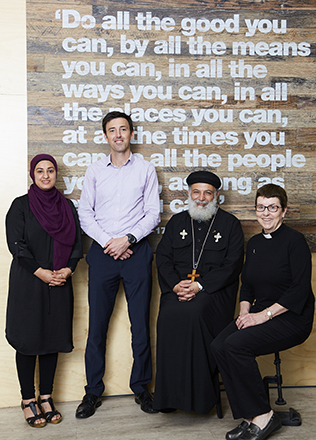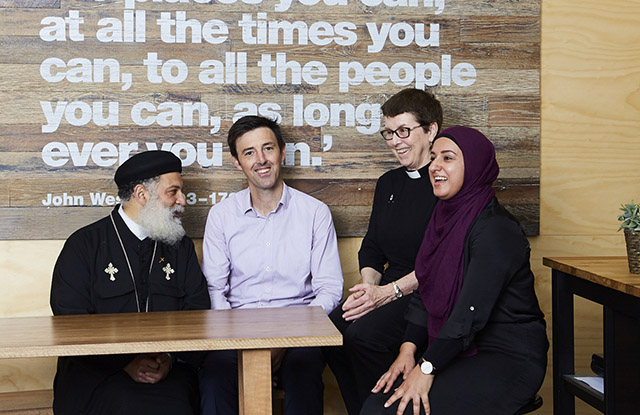Over the last couple of months there has been a lot of talk about “us” and “them”, about the disempowerment of the masses, about being “swamped by Muslims” and about stopping people seeking asylum from entering this country. If we can learn anything from our faith traditions, it’s that people of faith are people of hospitality, people of love, people of compassion and above all and most important — we are all God’s people.
Insights had a lot to talk about when we sat down with with Fr. Shenouda Mansour, General Secretary of the NSW Ecumnenical Council, Rev Margaret Mayman, minister at Pitt Street Uniting Church, Stewart Mills, member of the NSW Relations With Other Faiths Committee and Lina Jebeile, a former teacher and food blogger who is currently running a campaign #SpreadHummusNotHate. Donald Trump had just been elected President, and there was robust discussion ranging from how the media is amplifying a culture of fear of “the other”, to how hospitality — really honest hospitality — has the power to start healing, build relationships through valuable conversations, and also begin to heal wounds that really shouldn’t exist in Australia’s multicultural and diverse society.
Above all, though, we dared to suggest the perfect love and understanding, God’s perfect love — the love mentioned in 1 John 4:18 — can drive out fear.
This Christmas we want to reflect on how our relationships and stories — made and told over whatever and however you celebrate the holiday season — can give us hope for a better way to live with each other, inside the promise of the unconditional love and grace God has for us.
What do you recommend the Australian community could do, to combat the current climate of fear?
Lina Jebeile: So many things that we are not currently doing. I think first and foremost, open conversation. There are so many assumptions that are made about [my background] being Muslim. I get why people don’t understand, which is why it’s so important to have open conversation and to ask questions, because if you don’t ask questions you will never learn. It is really important not to ask questions in an offensive and derogatory way. Even though the talk is about unity, it is really still about “us” and “them”. Muslims are spoken about, rather than spoken to.
Margaret Mayman: And spoken ‘with’ would be really nice…
LJ: I get that people are afraid. I get that. How can you not be afraid, there’s so much stuff going on in the world that makes you afraid. I think people are forgetting that we [Muslims] are afraid too. Terrorists are killing more Muslims than they are anybody else in the world.
Fr. Shenouda Mansour: There wouldn’t be a migration of Muslims from the East if they weren’t fearful.
LJ: We’re afraid of the right-wing extremists. I fear for my family and, on the other hand, am I going to be a target of someone who has no idea of who I am and what I believe in, simply because of the way I am dressed? I have a young family and I am afraid for their safety and wellbeing. I was born and brought up in Australia and I feel a disconnect being Lebanese. So imagine them. They are further being disconnected from their Lebanese-ness. The whole reason I began the food blog was to hang on to that last bit of Lebanese-ness that I have, which is the food. My parents still speak in Arabic, but everywhere else is English and I’m an English teacher. I speak in English and I dream in English. My husband and I speak English to one another. My kids don’t speak very much Arabic. They are third generation and it’s unfair to think that they are going to grow up in a society where they are made to feel like they don’t belong. They love their country and they know nowhere else.
“…in terms of combating the climate of fear is to tell those stories…” – Margaret Mayman
MM: And if it wasn’t for extremism, the third generation usually experiences a sense of belonging, But without that, what’s happened globally has destabilised that natural progression of people beginning to feel at home and people accepting the new migrants. Apart from Australian Indigenous people, we are all migrants who come here with stories to tell.
Stewart Mills: In terms of engaging with the ‘other’, there’s been projects like Affinity. Since September 2001 [but] before September 11, there was a Turkish Afghan group out at the Auburn mosque. They started this idea of opening homes, and people from Christian backgrounds would come and meet and have a meal with a family from a Muslim background. So for many years Affinity, with the Uniting Church and other Christian communities, were actively involved in trying to get families from different faith backgrounds together. Every year Christians, Muslims and Jews come together and the whole idea is to find commonality and to demystify other faiths.
MM: I think in terms of combating the climate of fear is to tell those stories, to help people have those experiences but also to be aware of the fact that, yes, there is a climate of fear —
but also there are an amazing amount of people getting on with their lives and living in community together.
FS: People always talk about the Australian context. We are all Australians. We come from different lands, but now we have a new context. Australia is one of the most globalised countries in the world.
MM: How do we help celebrate that diversity rather than saying that has been lost to what was Australian?
LJ: There’s this group of people who are desperately clinging on to this ‘white Australia’ and they don’t realise we have gone way beyond that. ‘White Australia’ doesn’t exist and it’s not going to.
FS: People have migrated across the globe and there is not one country in the world that you could say is of one nationality. You can see from our faces, the wonderful colour and diversity and the inner beauty of humanity in each one of us.
What difference would it make in society if those of different faiths worked more closely together?
SM: We have this common faith tradition and at its fundamental level is about peace, justice, love, passion and protection of the less fortunate. From a Christian point of view, we talk about the fact that we are all children of God and we see each other as one. From an Islamic tradition there is ‘umma’ [which means ‘all people’], so there is that idea that we are all one in the image of God. So I guess we need to keep reminding ourselves of that.
“We all care about the common good and the wellbeing of God’s creation and God’s people.” – Margaret Mayman
MM: I think we also need to model hospitality which is common to all of our traditions. We need to ‘let it be known’ – it is an important thing that we take the risk to be public about how important the relationships are with people with other faiths and how not threatened we are. It is easy to characterise people as ‘the other’ but as part of our faith we are delighted to encounter Muslim and Jewish people who we will work together with on issues of justice and ecology. And there might be things we feel differently about but what matters is what we have in common and what we can do together. And we all care about the common good and the wellbeing of God’s creation and God’s people.
LJ: The whole ‘spread hummus not hate’ campaign is just a really casual way you can get together, sit down and have a chat about our day-to-day lives and, through that, automatically you will see how much you have in common.












